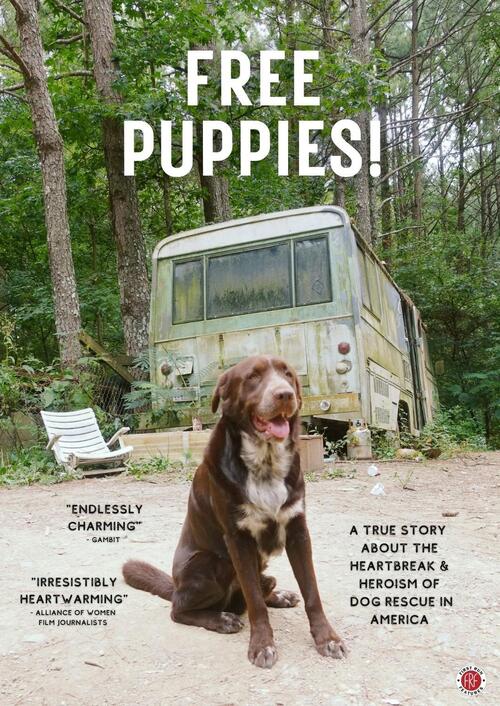Eye For Film >> Movies >> Free Puppies (2022) Film Review
Free Puppies
Reviewed by: Jennie Kermode

It was with Hurricane Katrina that the national rescue infrastructure first came together. Thousands of pets separated from their owners in Louisiana, or with owners who had lost everything and had no means of supporting them, were shipped up north so that they could be adopted. Later, several other shipments of rescue animals from southern States followed, receiving a good bit of news coverage because the animals were cute and the adopters thrilled to see them. There were no natural disasters occasioning these, however – so what was going on?
It’s a difference in culture, the rescue workers tell us, as Christina Thomas and Samantha Wishman’s documentary takes us to Georgia, Alabama and Tennessee to find out where the animals still being shipped today come from. Simply put, there are ten times as many animals in the rescue system here as up north. Few people spay or neuter their pets. The solution toi having too many is to dump them on other people, abandon them in the wilds or, if they’re still little and cute, leave a box on the sidewalk with a sign saying ‘free puppies’. They all start out little and cute, one rescuer warns, but most of them grow big, and then they risk being abandoned again.

The first dog we meet is Albert, who can’t use his hind legs but has found a doting owner who has provided him with strap-on wheels. It’s a delight to see him bouncing across sand dunes in the company of another dog who waits for him when necessary and clearly loves his company. This is a buoyant start to a film which takes in the heartbreak as well as the highs of dog rescue. It’s not a film for people who find animal cruelty too distressing to contemplate, or who can’t cope with the realities of what shelters with limited capacity have to do, but it will strongly appeal to those who want to educate themselves and work towards making animals’ lives better.
Alongside the tiny, wriggling puppies in pails and the wide-eyed purebreds which no kill shelters select, there are a whole lot of other dogs who need help. Sick and disabled dogs, dogs with behavioural problems (often stemming from neglect), old dogs, a black dogs (who struggle to find new homes because people find them scary). There are also dogs abandoned because they got pregnant. If they’re not too far along, one rescuer explains, she will always arrange an abortion, because it simply doesn’t make sense to expend resources on another litter of puppies when there are so many dogs who are already alive and in need.
Many of the dogs are surrendered directly to shelters, sometimes by owners who feel they can’t cope or simply don’t want them anymore, sometimes by people who have found them wandering. In other cases, the rescuers take them away from neglectful or abusive owners. There is a lot of unhappiness at the practice of leaving dogs chained up outside, often with very little room to move around. Some of the animals are in awful condition when they arrive, and they can’t all be saved.
Who are the people who do the rescue work? They are mostly women – here we follow Ann, Ruth and Monda – and they are all volunteers. One describes how her first experience as a dog owner came when she went to a puppy mill to buy a pet for her child, something which horrifies her now but keeps her alert to the fact that the problem stems primarily from ignorance. She was self-taught when she started out as a rescuer, which seems to be true for many people. Out in the woods, we meet two elderly brothers who always have a couple of dozen dogs running around, either because they’ve been abandoned nearby or because people see them as suitable carers for the animals they want to get rid of. Both disabled and scraping by on fixed incomes, they do their best, but are plainly unable to cope. In a poignant moment, one of them verges on tears as he flashes back to his service in the Vietnam War. It’s not altogether clear who is caring for who.
The film ends on a high note, as a charismatic dog whose story we have followed throughout finds the perfect home, but the look of amazement on the rescuer’s face as she realises that his new family will care for him properly is very telling. Animals shelters may be under particular pressure in the US South, but this is a worldwide problem. In the UK at present, the cost of living crisis is forcing many people to give up their pets. The film provides advice on some of the things you can do if you want to help, whoever and wherever you are.
Reviewed on: 11 Dec 2022
















